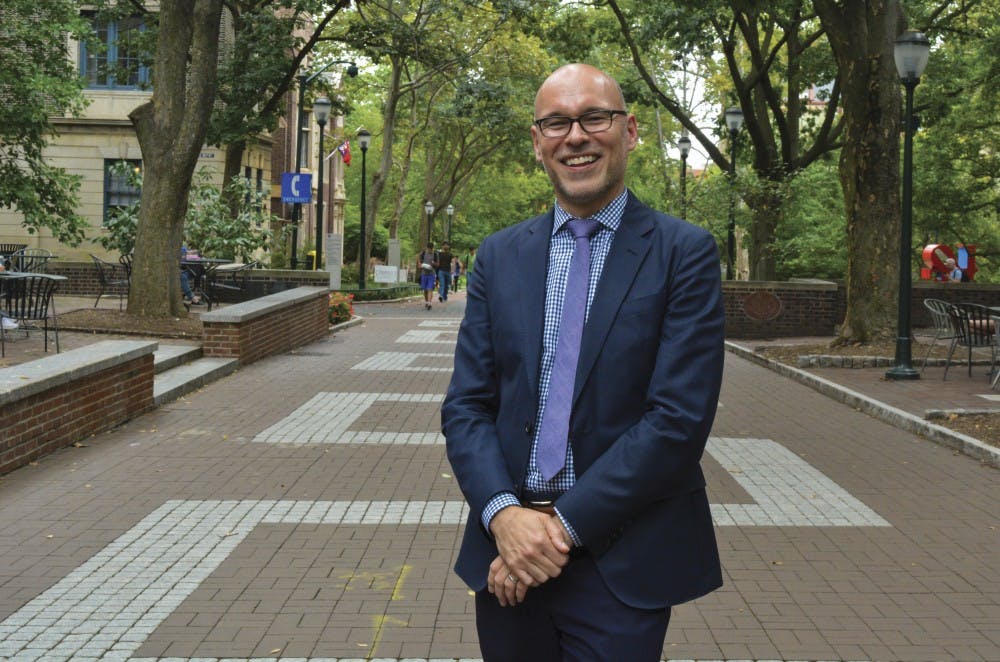When Benoit Dubé, 49, first received an email from an international search firm gauging his interest in the role of Penn’s inaugural Chief Wellness Officer, he took one look before sending the note straight to his trash. They send these emails to everyone, he figured, and besides, he was happy right where he was: a longtime professor of Psychiatry at the Perelman School of Medicine, with administrative titles that let him pursue his interests in education, wellness, and diversity.
But after another invitation from the Provost’s Office to apply for the position, the physician quickly emerged as the front-runner, eventually beating out hundreds of candidates from across the world. Now, as the Ivy League’s first Chief Wellness Officer, Dubé is charged with leading Penn’s strategy on an issue that has disenchanted students for years: mental wellness on campus.
“This was never part of my career trajectory,” Dubé said from his new office at 3611 Locust Walk. “But the more I talked to the Provost and his team, the more I realized I could do the same things but with a broader audience. I could still be a student advocate, but for more people. And that’s what hooked me.”
A physician by training, Dubé arrived at Penn as a medical resident in 1997 and has since held close to a dozen administrative positions, many geared towards improving student experiences. It was this mixture of medical expertise and interest in student life that drew the attention of Penn’s search team, Vice Provost for University Life Valarie Swain-Cade McCoullum said.
“It’s really extraordinary to me that we did a global search and found a candidate who was just three blocks away from College Hall,” Cade said. In the final stages of Penn’s selection process, eight candidates, including Dubé, were invited to meet a wide group of administrators, students and faculty. After two consecutive days of interviews, Dubé pulled forward, heads and shoulders above the rest, she said.
“It was his affect,” Cade added. “It was also the semantics, the words, the import of his definitions. Interwoven in what he said were all of the concepts that students had told me were important to them.”
Following years of student activism around mental wellness, President Amy Gutmann announced the position of a Chief Wellness Officer in April this year. The role, housed under VPUL, oversees four departments, including the Counseling and Psychological Services and the Office of Alcohol and Other Drug Program Initiatives. It is designed to consolidate and coordinate wellness initiatives across the University — a response, in part, to the frequent criticisms that resources and policies at Penn are too decentralized to navigate.
In his new position, not only will Dubé have to manage departments he has not led before, he will also have to work with deans from Penn’s 12 schools, dozens of administrators, faculty members, and student leaders, many of whom have different ideas for how to improve wellness on campus.
Dubé has already gotten a taste of this challenge. Less than a week into his job, Wharton administrators unveiled their decision to change Huntsman Hall’s operating hours in an effort to improve student wellness — a move that quickly proved unpopular with students.
“I had a feeling that this wasn’t going to be as successful as they thought… But it’s not my place to come in and undermine the dean of Wharton,” Dubé said.
“If we were to roll back time, I’m pretty sure it would have happened differently. And maybe with a centralizing, administrative government, we can prevent misunderstandings like this,” he added. “I want to make sure that students are heard, and I want to make sure they are part of the solution, not handed a solution.”
Before this role, Dubé spent much of his time as the director of Medical Student Education in Psychiatry at Perelman School of Medicine, which allowed him to interact extensively with students, said Department Chair of Psychiatry Maria A. Oquendo.
“More than many faculty members, he was really involved in the day-to-day interactions with students. And so he’s acutely aware of the student experience,” Oquendo said.

Benoit Dubé in his Locust Walk office.
Dubé describes himself as a strong student advocate, though he recognizes the students he has worked with until this point have been from the medical school. From his perspective, learning how to represent Penn’s seven other graduate schools and the four undergraduate schools is his biggest challenge.
“I really see my responsibility as approaching this from a position of humility and to ask questions so that people will give me the lay of the land,” he said. “I have some ideas on the issues, but maybe my ideas are wrong. It’s from talking and listening that I’ll figure this out.”
College senior and President of the Undergraduate Assembly Michael Krone met with Dubé over the summer along with Graduate and Professional Student Assembly President Haley Pilgrim and MERT Chief David Gordon.
“I thought he had a lot of really great ideas and a lot of really cool experience,” Krone said. “[But] obviously there will be a learning curve in terms of learning how to work with undergraduates and make that pivot from working in the med school.”
Moving forward, Dubé said he plans to take a three-pronged approach to addressing wellness: equipping students with the skills to manage stressful situations, improving the academic environment, and working to “infuse” Penn’s culture with ideas on wellness. One of his first steps is to start an administrative overhaul of the departments relating to wellness at Penn.
“We can’t just say we want to integrate [wellness] on paper,” Dubé explained. “We actually have to integrate it.”
While the physician is clear-eyed about the challenges that lie ahead, he said he is above all, excited for his new post. Standing in front of his office on Locust Walk, he noted, “The last time I felt this energized was when I started medical school.”








